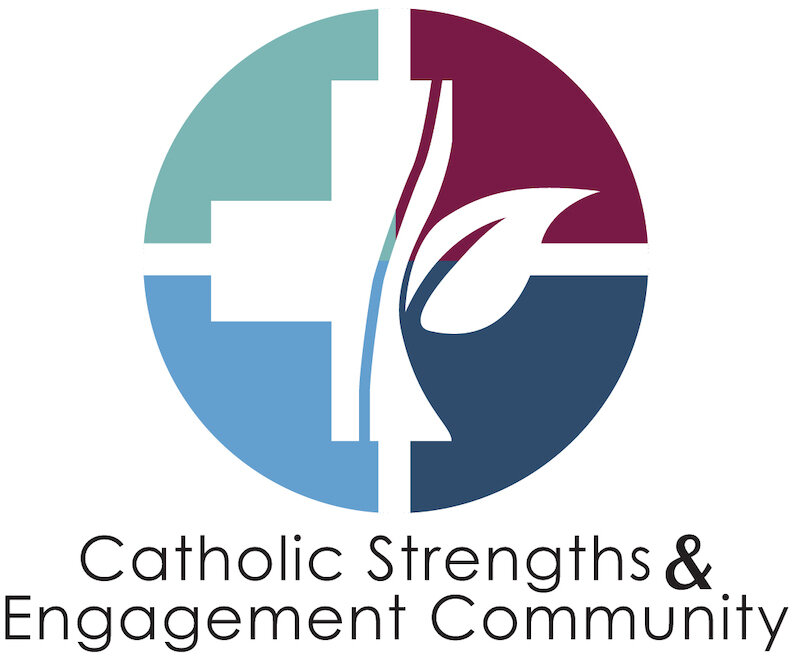Strengths in Community
Cultivating a Spirituality of Communion
“To make the Church the home and the school of communion: that is the great challenge facing us in the millennium which is now beginning, if we wish to be faithful to God's plan and respond to the world's deepest yearnings,” St. John Paul II wrote in his pastoral letter at the turn of the century, Novo Millennio Ineunte (#43). It is this spirituality of communion we are cultivating when we embrace strengths development within our faith communities. By doing so, our daily interactions with one another take on deeper meaning. We learn through our interactions with each other that while appreciating the talent God has given each of us, our talents are given for the good of all, not as something for the individual to prize or hoard.
Again from St. John Paul II: “A spirituality of communion indicates above all the heart's contemplation of the mystery of the Trinity dwelling in us, and whose light we must also be able to see shining on the face of the brothers and sisters around us.
“A spirituality of communion also means an ability to think of our brothers and sisters in faith within the profound unity of the Mystical Body, and therefore as "those who are a part of me". This makes us able to share their joys and sufferings, to sense their desires and attend to their needs, to offer them deep and genuine friendship.
“A spirituality of communion implies also the ability to see what is positive in others, to welcome it and prize it as a gift from God: not only as a gift for the brother or sister who has received it directly, but also as a "gift for me".
“A spirituality of communion means, finally, to know how to "make room" for our brothers and sisters, bearing "each other’s burdens" (Gal 6:2) and resisting the selfish temptations which constantly beset us and provoke competition, careerism, distrust and jealousy.
“Let us have no illusions: unless we follow this spiritual path, external structures of communion will serve very little purpose. They would become mechanisms without a soul, "masks" of communion rather than its means of expression and growth.” (Novo Millennio Ineunte, #43)
The CliftonStrengths© Talent Identification Instrument
If our talents are so innate within us, why do we need an online questionnaire to point them out for us? It is for this very reason that CliftonStrengths is helpful. Our greatest areas of talent are patterns of thinking, feeling or behaving that come so naturally to us that we often do not recognize them without some help. The research of Dr. Donald Clifton and his team, which is the foundation of strengths, tells us much about the ways in which we experience our talents, and why it is so important that we do so. We are at our best when we do what we do best, the research tells us. Weakness-fixing at best produces adequacy. But strengths development goes much deeper. We find that living with an awareness and acceptance of our God-given talents helps us to be more patient with others, more understanding and forgiving, find greater meaning and purpose in our lives, and to live with a sense of hope. Surely this is what God desires for his preeminent creation!
CliftonStrengths© is an online questionnaire. On completing CliftonStrengths, an individual is given a list of his or her Top 5 themes out of the possible 34 themes of talent identified through over thirty years of study. Because CliftonStrengths is research-based, people frequently report that their Signature Themes resonate with their experience differently than with other self-assessments they have done in the past. And because strengths is developmental, it is actionable. This is not simply about being aware of our talents; this is an ongoing process of cultivating, sharing and developing our talents to yield with increase, as good stewards of the very unique persons we are.
Strengths in the Faith Community
The essential concepts contained in strengths development are simple and have the potential for profound impact in our pastoral practice. We find ourselves building on what is the best about each person, what is positive, rather than dwelling on what is not; we find freedom to be ourselves, to trust each other, and to find hope in Christ and in the community of which we are a part.
Community as a Relationship
Reading Growing an Engaged Church, we find ourselves understanding that when people come into a faith community, they are entering into a potential relationship. Viewing the parish in this light helps us to grasp the impact of the connection between strengths and engagement. In fact, one of the transformative aspects of engagement is that this research-verified dynamic of communal life is expressed as a feelingor a sense. People know engagement when they feelit or senseit; they are also conscious of its absence when such is true of a parish’s life. People readily feel growth in engagement and respond accordingly, particularly when they find that it is hoped and expected that every person will give of her- or himself as a good steward of the talents she or he has been given.
Every Person is of Value, the Community is of Value
In an engaged community, individuals perceive that every person is of value, and that the community is of value in their lives. This value on the person does not stand in contradiction to the importance of worship in the community, but rather helps people to be predisposed to gather for communal worship with open minds and hearts, ready to be transformed by Christ, sure of the strength and the support of the community. As communities become larger or are drawn into clusters of parishes that share pastoral leadership, the implications of such value are certain to become more apparent and of greater importance.

